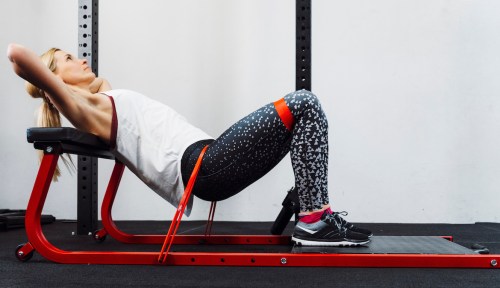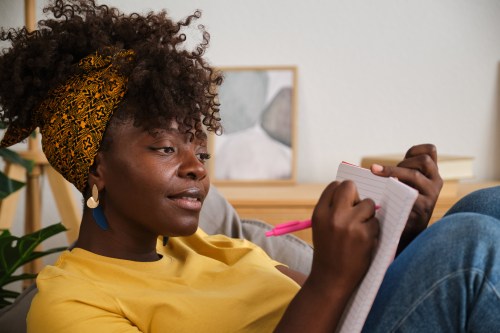It’s often described as the world’s toughest team to make, and for good reason: No country has brought home more Olympic track and field medals than Team USA.
Experts in This Article
an NBC sports analyst and three-time Olympian who is the fastest American woman in history at 400 meters
Sanya Richards-Ross knows a thing or two about the pressure the athletes are under. During her professional running career, the three-time Olympian and five-time Olympic medalist was a dominant force at 400 meters. In fact, she’s still the fastest American woman in history at the distance—a record she’s held for 18 years.
Since retiring in 2016, Richards-Ross has hardly slowed down. In her seventh season as an NBC sports analyst, the book author, entrepreneur, and yes, former Real Housewives of Atlanta cast member, is a (very) busy mother of two.
She sat down with us in between her U.S. Track and Field Trials broadcast duties at Hayward Field in Eugene, Oregon, to discuss what life looks like now and reflect on the lessons that have helped her look, feel, and perform her best in this current season of life.
1. Motivation wanes, discipline doesn’t
If you think it’s easier for elite athletes to maintain their drive to exercise, think again.
“In the first two or three years after retiring, I really struggled to get motivated to work out,” Richards-Ross says. “I realized that I wasn’t one of those people who just ‘had to get a workout in.’ It was the goal of winning Olympic gold or going for an American record—that’s what really motivated me to move. So I had to find my new motivation and new inspiration.”
But signing up for a race or striving for a super-competitive goal wasn’t the right move.
“I have a bad toe—that’s actually what took me out of the sport—so it’s very painful for me to run. I’m not able to do anything close to what I used to do,” she says.
The successful solution that has helped reignite her motivation? A home gym and a reliable workout partner.
“My husband [Super Bowl champion cornerback Aaron Ross] has a good workout routine,” she says. “We have a gym at home so we work out together. We do a lot of strength training. I do a lot of bodyweight stuff—push-ups, core, pull-ups, stuff like that. And then we have a treadmill, so I’ll do very light running and walking. I used to do a lot of yoga and Pilates while I was competing, so I incorporate my sun salutations, too.”
Not only does the easy access of at-home equipment help keep her routine consistent, the quality time with her husband is an added incentive to stick with it.
“I find it to be a really cool time for us to spend together,” she says. “We have the kids, and I have a million jobs, so when the kids are sleeping we’ll run down and get a workout in. It’s a kind of bonding time for us, which makes it special.”
“As an athlete, I have always learned to accept and appreciate the phases of my body and what it can give me.” —Sanya Richards-Ross
2. Your body is your teammate—not your enemy
“My body has changed a lot,” the 39-year-old mother of two says. “I can’t work out the same way I used to—the same exercises don’t work. I’m just different all around.”
Here’s the important part, though: She doesn’t let that change affect her in a negative way.
“As an athlete, I have always learned to accept and appreciate the phases of my body and what it can give me,” she says. “For me, it’s been about really being okay with the new body I’m in. I try take it in stride, and I’m just like, ‘Okay, what can I do now?’”
The key for Richards-Ross is knowing that you don’t have to unconditionally love every little thing about your body at every single moment, but your desire for change is going to be healthiest (and most successful) when it comes from a proactive (and loving) place. How can you tackle this together, rather than viewing it as you versus your body?
3. Eating well is non-negotiable
When you’re a pro athlete, you’re doing all the little things right. You’re eating healthy, drinking plenty of water, getting enough rest—generally just taking really, really good care of your body. So it can be hard to know which healthy habit is having the biggest impact.
That’s become a bit easier for Richards-Ross to separate in her post-retirement life. Today, she can clearly see the power of good nutrition and the near-immediate effect eating well and drinking enough water has on her day-to-day life.
“When I was training, my dad used to juice all my fruits and vegetables. When I didn’t have that anymore, I still ate well, but not like I did before,” she says. “Now as I’m getting older, I can feel the difference when I don’t put good foods in my body consistently. I feel lazier, I feel more tired, I don’t have the same kind of energy. When I’m eating really well, I’m full of energy, I rest better–all of those things I used to just naturally do before. You can’t make it an afterthought, it needs to be a priority.”
4. Support is a team sport
Spend any amount of time on Richards-Ross’ Instagram, and you’ll see that her family means the world to her. And it’s their unwavering love that sets the foundation for her to flourish.
“When I look back on my career—especially when I went through college—there were a lot of athletes who were equally as talented as me, and I would always say the differentiator from those who didn’t make it to the Olympics or go on to become Olympic champions was my family support, hands down,” she says.
This has helped her come to value the importance of people and relationships from a very young age.
“My coach was my coach for 13 years—my whole career,” she says. “My physical therapist was with me for 10 years, my strength coach was with me for 16 years. I feel like all of my experiences happen for a reason, and I feel like we’re meant to be together for a reason.”
That goes for her professional relationships, too—like her 20-year contract with Nike, one of the longest running partnerships in the brand’s history.
“I’ll never forget being in Jamaica, and the first pair of spikes I ran in were a pair of white, yellow, and blue Nikes,” she says. “Even as a kid, I always wanted to be a part of the Nike family.”
But for Richards-Ross, it’s not just about how people can help her succeed, but how she can help them succeed, too.
“I’m a genuine person who really likes to build relationships. I pour a lot into them, and they mean a lot to me.” Whether it’s Nike, NBC, or her family and friends, “they’ve enriched my life in so many ways, and it’s my hope that I also bring that kind of value to them in all the things that I do.”
That mindset is definitely one you want to steal: Research has shown that altruistic people report feeling happier, more energetic, less stressed, and better able to deal with loss and disappointment. (In fact, even just thinking, “What can I do to help others?” without taking any action helped people turn off destructive emotional circuits like hostility and frustration.)
“Records are meant to be broken. In my time, I could only chase my record. I did that with everything in me—and I got it. And now I set a mark that women have been chasing for 18 years. When it falls, which I know it will—athletes are going to get better, there are better tracks, there are better spikes, better technology—I’m at peace with that.” —Sanya Richards-Ross
5. Change is coming, so prepare positively
All good things must come to an end, and no one knows that better than Richards-Ross. In 2016, the reigning 400-meter Olympic champion was trying to make her fourth Olympic team. At 31 years old, she had already announced that this one would be her last—no matter how it ended.
After suffering a hamstring strain just two weeks before Olympic Trials, Richards-Ross stopped sprinting halfway through the preliminary heat, walking the final 200 meters to the finish line as she waved to the crowd. That would be the last race of her career.
But that moment wasn’t nearly as devastating as it could have been. Unlike a lot of athletes, Richards-Ross was very intentional about how she prepared herself for the transition from track to the next phase of her life.
“In 2016, I said a prayer every day. I said, ‘God, thank you so much for the gift of track and field, and for the many ways it blessed my life. But I know that every blessing isn’t meant to last a lifetime. So I offer this gift back to you, but I ask you to leave with me all of the good things—like the discipline it taught me, the hard work, the understanding of delayed gratification.’”
This mindful preparation, plus incorporating positive affirmations (“I’m more than an athlete”), helped Richards-Ross find excitement around what was up ahead rather than dreading what she was leaving behind.
“I was really happy with how I was able to take everything I did on the track and kind of use it as—I hate to call it a stepping stone, because it was way more than that, it was a huge, great foundation for my life—but I would say I didn’t really struggle a lot; I felt prepared for it.”
6. Go full steam ahead
Changing careers. Getting married. Starting a family. Moving across the country. These kinds of big transitions in life can bring about some seriously big emotions—mainly doubt, fear, and worry. But Richards-Ross believes leaning into and challenging those emotions will always be more productive than doing nothing.
“I just think women have to give themselves permission to accept new opportunities and be okay with failing and learning as you go,” she says. “I think a lot of people want to stay in the same space because it feels safe, it feels good. In the same way I think a lot of athletes stay in the sport longer than they should. It’s because they’re afraid of the next thing.”
One major lesson sport has taught Richards-Ross is that the fears that often hold us back—like the fear of failure, and the unknown—are not as devastating as your mind lets you believe. After getting bronze in the 2008 Beijing Olympics, she thought the world was going to end.
“I thought that that was it, life was over,” she says. “And then, the sun came up and the people who love me were still there and everything that mattered was still the same. So I’m not afraid to try something and fail, because I’ve failed already on the grandest scale. It can’t get worse than that.”
Embracing the possibility of failure allows for another outcome, too.
“To be honest, of course my track journey was unbelievable, but this phase of my life feels very full and very rich and very special. I wouldn’t trade it for the world, so I think that we just can’t be afraid of what’s next,” she says.
7. You’re so much more than your career
Being proud of your accomplishments or identifying closely with your career success isn’t necessarily a bad thing. But it can make you more vulnerable to bigger issues like depression, anxiety, or a painful identity crisis if and when those statuses change.
“Sydney Michelle McLaughlin-Levrone is very close to my American record and everybody thinks I’m having a heart attack about it,” Richards-Ross says. “I’m like, no, records are meant to be broken. In my time, I could only chase my record. I did that with everything in me—and I got it. And now I set a mark that women have been chasing for 18 years. When it falls, which I know it will—athletes are going to get better, there are better tracks, there are better spikes, better technology—I’m at peace with that.”
That peace comes from how intentional she’s been about not tying her identity solely to her success on the track.
“I feel like I’m so much more than that, so it doesn’t matter if my American record falls, because that’s a part of my journey but it’s certainly not who I am wholly,” she says. “I identify with way more. Being a mom means so much more to me than anything else, and I still get to be a mom to my two amazing sons. It doesn’t take anything away from who I am.”
Sign Up for Our Daily Newsletter
Get all the latest in wellness, trends, food, fitness, beauty, and more delivered right to your inbox.
Got it, you've been added to our email list.











